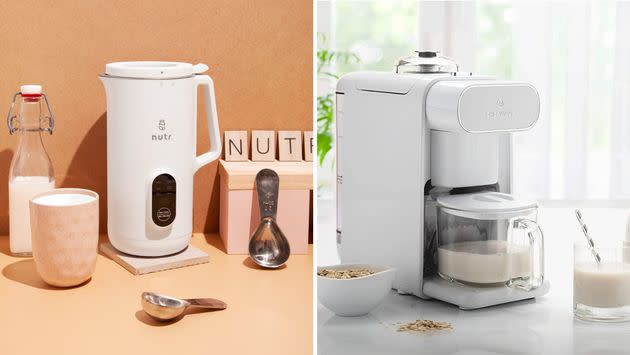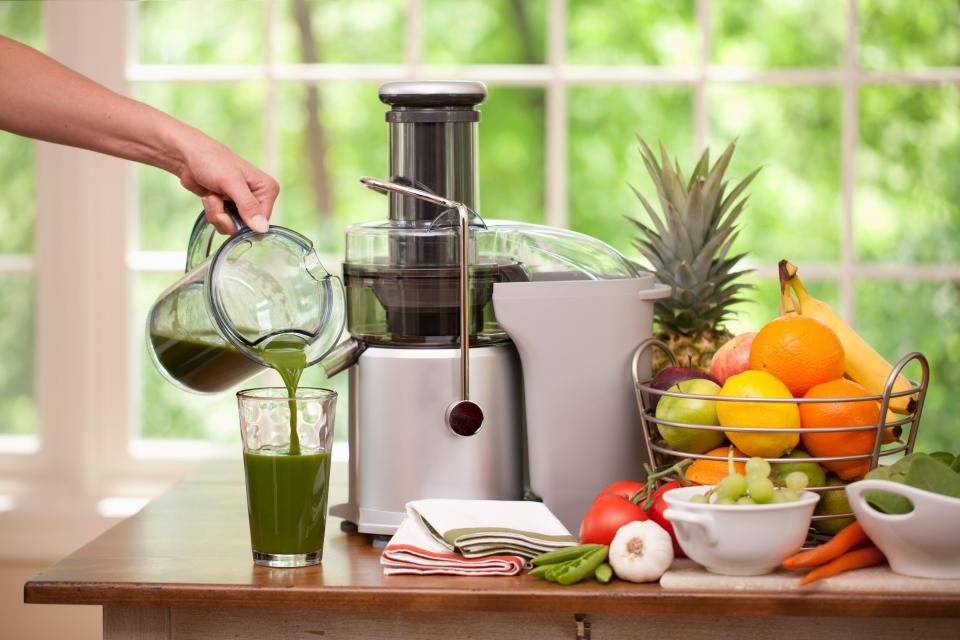Plant Milk Makers: Are They Really Worth It?

I confess, I am no KonMari follower. My kitchen is stuffed with specialty appliances ranging from a Benedict egg maker to a miniature Bundt cake baker. But there always comes a time ― usually after the turn of the year, when my husband is cleaning out but I’m eyeing the after-holiday sales ― when my husband looks at me and intones, “No more.”
This January, with three different kinds of turkey fryers from the holidays still lingering out on the patio, I replied, “Not even a plant-based milk maker?”
And I could swear, as an avowed oat milk drinker, he hesitated.
What is plant-based milk?
Most of us are familiar by now with soy, almond or oat milk. But plant-based (i.e., nondairy or vegan) milks really can be manufactured with any nuts, seeds, legumes, grains or even fibrous plant matter. From pea to hemp, these materials are first soaked, then pureed, strained and sometimes boiled.
The resulting milk is often sweetened with anything from agave to dates and flavored with spices such as nutmeg and cinnamon. If it’s going on the market, it’s also occasionally stabilized (with ingredients like carrageenan) or preserved (with other multisyllabic ingredients). Commercial nondairy milks are sometimes organic, and sometimes not.
So, should you make it or buy it?
The advantages to making your own vegan milks are manifold. For consumers like She L. Robinson, a public relations and branding strategist who is diabetic, it was initially about controlling her sugars and carbs. But the Georgia-based marketing professional quickly learned that her preferred healthy choices, walnut and pecan, were not widely produced. This led her to start rendering a variety of flavors, including hemp.
“Hemp is what I have used to replace cow’s milk in formula for my grandchildren who had an extremely hard time processing traditional formula, when mom wasn’t consistent in milk production to keep up with baby’s needs,” she said. “I mean, have you had the chance to read the ingredients in the commercial baby formula? The list is outrageous.”
However, she does concede that she’ll purchase the more popular choices, including coconut and oat milk, both out of convenience and because the products are good. “Buying them is a lot easier than making them. I tend to go for Silk when I buy coconut milk and Elmhurst when I buy oat milk. These two are amazing in making sauces, creams or drinks that you want to have a heavier, more creamy texture.”
Darline Dorcely, chef and general manager of Chef Liline, a premium catering service based in Stamford, Connecticut, decries canned coconut milk. “I prefer to make my own,” she said. “It tastes so much better. It’s fresh from the coconut and there are no preservatives.”
“Homemade or store-bought, a good quality nut milk will supply vitamins, minerals, phytonutrients and antioxidants,” said Serena Poon, certified nutritionist and celebrity chef to clients such as Kerry Washington. “Some of my personal favorite plant-based milks include almond milk, cashew milk, macadamia milk and pumpkin seed milk (a great source of zinc).”
Still, you’re not likely to find macadamia or pumpkin milk in the local market. These are just some of the reasons you might want to, as she says, “experiment in the kitchen and deepen connections to your food.”
“That being said, I don’t want to discourage anyone from buying packaged nut milk in the store if that is the better option for their lifestyle,” Poon said. “It does become important to really check the labels on these milks. Opt for organic nut milk with few ingredients, ideally just two: nuts and water. Packaged plant-based milks tend to contain fillers and added sugar that can detract from their nutritional value.”
Do you really need a special appliance to make plant-based milk?
The short answer is no ... and yes. It depends on your lifestyle, comfort level and the amount of time you want to commit to working with the ingredients and cleaning them up.
It’s not a difficult learning curve, but it can be time-consuming and messy. Some appliances will take care of everything for you ― even dispose of the pulp ― and all you have to do is put the right amount of ingredients in the machine, according to the accompanying recipe manuals. They don’t even ask that you soak the materials first (soaking makes the milk creamy) because the mechanisms and technology inside the appliance will take care of that aspect. These appliances often resemble a cross between a food processor and a coffee maker.
But other tools are really just mills or even carafes, which means that you’re responsible for soaking raw nuts, seeds or legumes first. Depending on the ingredients, that can take anywhere from six hours to overnight, and even up to 48 hours. Then you need to blend, strain and, in some cases, boil (which you must do with soy to get rid of certain chemical compounds). It’s ... a lot.
Robinson, who makes her milks daily, uses her Instant Pot Ace Nova Cooking Blender, which has a milk-making speed option, and a cheese cloth. But you can really use any blender.

If you do want a plant-based milk maker, which one should you get?
If you don’t already have a blender or you need more guidance, there are a good number of home appliances on the market that are created specifically for making plant-based milks. They range from the simplest and most inexpensive products, like the Chef’n Nut Milk Maker ($25) ― a basic carafe that requires you to soak and strain ― to the hard-to-swallow Almond Cow ($1,195), which creates 2 gallons in minutes without any prep at all.
Some are very specific. For those who are single or the only vegan in the house, the Nutr Machine ($169) is a single-server. Tayama ($67.51) is only for soy milk, but also can cook other soy products. The VeganMilker by ChufaMix ($59.90) is compact and inexpensive, but requires that you already have an appliance to initially mill the materials.
For kitchen appliance fans, the most interesting ones lie in between, in the moderately priced options. The Soyabella Automatic Nut & Seed Milk Maker ($109.95) from Lifeboost (which is also marketed under the name Tribest) converts into a coffee or spice grinder, and also cooks soup. The ChefWave Milkmade ($209.95) is as easy to use as a coffee machine. It has preset programs for six different kinds of milks, along with a delayed start and auto-cleaning.
In the end, as long as we read labels, there’s no right or wrong way to look at it. We get to decide how to invest our time and money: Supporting the producers making literal advances in the field or experimenting in the kitchen with our own appliances. As long as we have cabinet and counter space, that is.
HuffPost may receive a share from purchases made via links on this page. Every item is independently selected by the HuffPost Shopping team. Prices and availability are subject to change.
This article originally appeared on HuffPost and has been updated.

 Yahoo Movies
Yahoo Movies 


